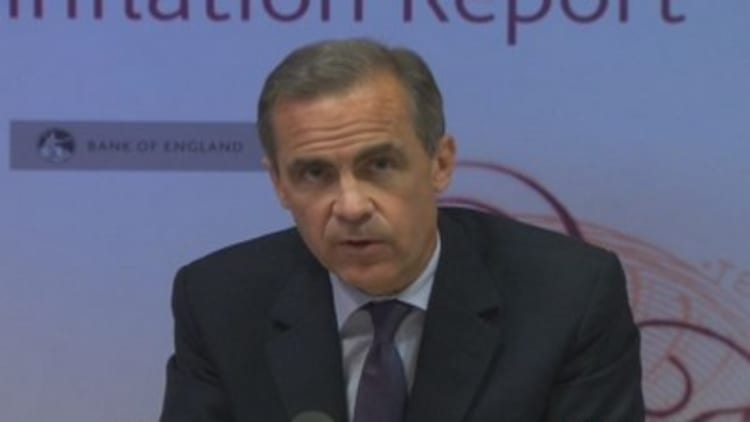The slipped to a four-week low against the dollar on Wednesday morning after investors were left disappointed following the Bank of England's (BoE) inflation report.
The U.K. central bank left its growth and inflation forecasts broadly unchanged, meaning a rise of its main benchmark rate is still expected in the first half of 2015. This surprised markets and a recent run-up in the currency quickly reversed after the release. Sterling fell to $1.6757 after trading higher for much of the session and peaking at $1.6874.
Read MoreBoE plays down earlier rate hike expectations
BoE Governor Mark Carney played down expectations of an earlier-than-expected rise in interest rates at a press conference following the report. He said that a hike would depend on the degree of slack in the U.K. economy, and the prospects for its absorption.
"Carney left those expecting an early rate hike from the Bank of England a little disappointed," Alex Edwards, the head of the corporate desk at UKForex, said in a research note.
"GBP/USD has been sold off, but the Bank haven't signaled any major discomfort with the high value of the GBP/USD exchange rate. In our view, it means this might present opportunities to buy GBP/USD, especially if we continue to see upside surprises to U.K. economic data over coming months."

After years of sluggish growth following the 2008 financial crisis, the U.K. economy has finally come back into its own and is set to clock up a healthy 3 percent growth rate this year. However, house prices remain a concern, with a 10 percent surge over the past year stoking fears of a bubble.
Read MoreIs sterling punching above its weight?
As the economy recovers, many industry watchers have speculated that the central bank could raise interest rates from all-time lows of 0.5 percent in a bid to offset inflation. Consequently the pound jumped 13 percent since last July, and was trading around $1.6833 at the beginning of the session.
While manufacturing and service sector data in the U.K. is accelerating, analysts have underlines that retail sales growth remains weak. More importantly, annualized consumer price growth slowed to 1.6 percent in March from 1.7 percent in February, dampening rate hike expectations.
"The strong currency also puts further pressure on inflation and as long as the risk of a jump in inflation expectations is low, the BoE may prefer to keep monetary policy steady for the time being," Kathy Lien, managing director at BK Asset Management, said before the announcement.
She said the BoE could move to tame housing market inflation by scaling back its Help-to-Buy scheme and imposing mortgage restrictions, rather than tightening monetary policy.


